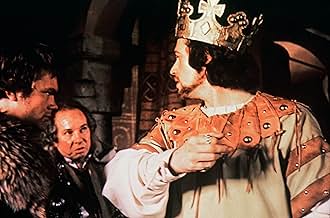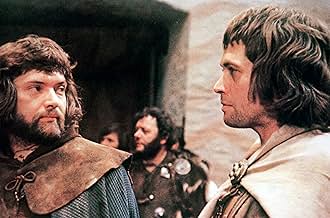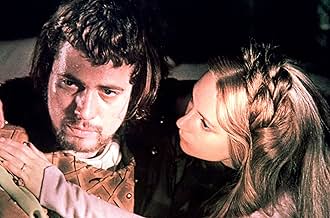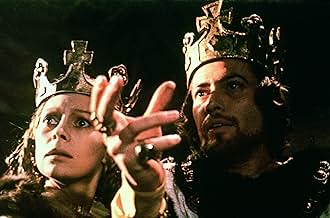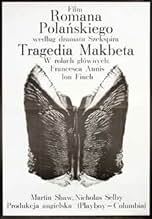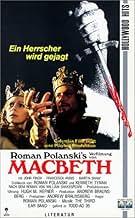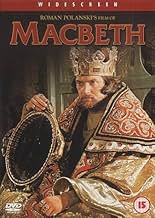CALIFICACIÓN DE IMDb
7.4/10
16 k
TU CALIFICACIÓN
Un lord escocés despiadadamente ambicioso toma el trono con la ayuda de su intrigante esposa y un trío de brujas.Un lord escocés despiadadamente ambicioso toma el trono con la ayuda de su intrigante esposa y un trío de brujas.Un lord escocés despiadadamente ambicioso toma el trono con la ayuda de su intrigante esposa y un trío de brujas.
- Dirección
- Guionistas
- Elenco
- Ganó 1 premio BAFTA
- 3 premios ganados y 2 nominaciones en total
- Dirección
- Guionistas
- Todo el elenco y el equipo
- Producción, taquilla y más en IMDbPro
Opiniones destacadas
To say that this adaptation is a bit of a bloodbath is a bit of an understatement, but you cannot deny that this film from Roman Polanski is quite possibly the definitive film version of Shakespeare's play, which is very complicated to even contemplate transcribing to screen. The cinematography is excellent, as is the script. It is true that there are a lot of disturbing scenes, chiefly Lady Macbeth's nude sleepwalker scene and King Duncan's death. Roman Polanski should be commended for how much he managed to get into the film, and he somehow made it all effective. Any scene with the three witches, the murder of Macduff's family, plus the part when Macbeth sees Banquo's ghost was very well done.(I saw an amateur production of this, and not only was it disappointing, but that particular scene was the worst aspect of it) The performances were brilliant, Jon Finch(who did start off uncomfortable) is great on the whole as the treacherous thane-turned-king, and Francessca Annis was nigh-on-perfect as Lady Macbeth. And Martin Shaw was excellent as Banquo. From the suitably eerie opening scene, to the superb climax, this is a near-perfect adaptation, there were just some bits that were really disturbing to watch, that deserves more recognition. 9/10 Bethany Cox
I remember watching this film in my Grade 11 English class when we were studying William Shakespeare's "Macbeth". Reading the story a couple of times, I rather enjoyed the classic tale to a degree. Whether or not it would convincingly translate to film, I, along with my class, was about to find out...with Roman Polanski's 1971 film adaptation, also produced by - HUGH HEFNER?!? As strangely amusing as the "Playboy" credit seemed in the opening credits, we were prepared for a very interesting take on the famous, violent play.
Shakespearean tragedies/comedies being translated to film are nothing new, of course. There have been some clear hits and misses over the decades - but fortunately, "Macbeth" does not fall into that latter "miss" category, for it is a tremendously underrated, very surprising, and overall competently made film. Roman Polanski is an excellent director here, and the acting, music, and effects (some of which - particularly the "dagger/murder" sequence - perversely amused my fellow classmates, who are obviously jaded by today's overblown, unsubtle, effects-laden "dramas") worked well for me. As well, the graphic violent and sexual nature of the film (which was also sometimes entertaining to the class, sadly) shocked me quite a bit. Of course, for a film made in 1971, Polanski's "Macbeth" isn't exactly "tame", if you will. Apparently it was rated X at the time, when the notorious film rating existed. I'm not sure if that's true or not, but it clearly wouldn't be surprising if it were, especially considering how intense this film can get - both physically and psychologically. It works extremely well as an old-fashioned action-packed thriller, and even to someone who knew the story fairly well, it was an exciting little soap opera to behold. The class really enjoyed it as well, I'm glad to say; even for all its "old" qualities (i.e. the twangy psychadelic-sounding music that plays upon the closing credits) it still achieved a certain charm that was impossible to deny.
One of the most impressive and enjoyable Shakespearean films I have ever seen, "Macbeth" deserves much more acclaim than scorn - for it is well-made, and enormously faithful to its original source, capturing all the details of ol' Scotland and its inhabitants with great care. It's a wonderful treat. Highly recommended.
Shakespearean tragedies/comedies being translated to film are nothing new, of course. There have been some clear hits and misses over the decades - but fortunately, "Macbeth" does not fall into that latter "miss" category, for it is a tremendously underrated, very surprising, and overall competently made film. Roman Polanski is an excellent director here, and the acting, music, and effects (some of which - particularly the "dagger/murder" sequence - perversely amused my fellow classmates, who are obviously jaded by today's overblown, unsubtle, effects-laden "dramas") worked well for me. As well, the graphic violent and sexual nature of the film (which was also sometimes entertaining to the class, sadly) shocked me quite a bit. Of course, for a film made in 1971, Polanski's "Macbeth" isn't exactly "tame", if you will. Apparently it was rated X at the time, when the notorious film rating existed. I'm not sure if that's true or not, but it clearly wouldn't be surprising if it were, especially considering how intense this film can get - both physically and psychologically. It works extremely well as an old-fashioned action-packed thriller, and even to someone who knew the story fairly well, it was an exciting little soap opera to behold. The class really enjoyed it as well, I'm glad to say; even for all its "old" qualities (i.e. the twangy psychadelic-sounding music that plays upon the closing credits) it still achieved a certain charm that was impossible to deny.
One of the most impressive and enjoyable Shakespearean films I have ever seen, "Macbeth" deserves much more acclaim than scorn - for it is well-made, and enormously faithful to its original source, capturing all the details of ol' Scotland and its inhabitants with great care. It's a wonderful treat. Highly recommended.
Roman Polanski's blood-soaked version of Shakespeare's Scottish play was the video version of choice when we were studying this at school, in spite of it having a nude Lady Macbeth and witches (and Keith Chegwin in the cast - he's Banquo's son).
Jon Finch has the lead and he is exceptionally good. Even a dagger which really appears to float before him (an effect not needed) doesn't spoil things. Odd that he never really got good movie roles after this. His Lady M is Francesca Annis, a spider of a schemer, also putting in a good performance.
Less adequate are Martin Shaw as Banquo, Stephan Chase as Malcolm, and Sydney Bromley as the Porter, although Terence Bayler gives good value as Macduff.
Perhaps this Macbeth is the first one to be truly cinematic, something that even Orson Welles couldn't achieve with Scots accents and Scandinavian settings. It remains memorable long after seeing and, in its excesses, opens up the text for a new generation, and finally, sees the repellent murdering usurper get what he deserves.
(Incidentally for perspective, the book 'Macbeth - man and myth' by Nick Aitchison looks at the real historic facts in accessible coffee-table book style).
Jon Finch has the lead and he is exceptionally good. Even a dagger which really appears to float before him (an effect not needed) doesn't spoil things. Odd that he never really got good movie roles after this. His Lady M is Francesca Annis, a spider of a schemer, also putting in a good performance.
Less adequate are Martin Shaw as Banquo, Stephan Chase as Malcolm, and Sydney Bromley as the Porter, although Terence Bayler gives good value as Macduff.
Perhaps this Macbeth is the first one to be truly cinematic, something that even Orson Welles couldn't achieve with Scots accents and Scandinavian settings. It remains memorable long after seeing and, in its excesses, opens up the text for a new generation, and finally, sees the repellent murdering usurper get what he deserves.
(Incidentally for perspective, the book 'Macbeth - man and myth' by Nick Aitchison looks at the real historic facts in accessible coffee-table book style).
"The Tragedy of Macbeth" (simply abbreviated "Macbeth" on most video covers) is a violent retelling of Shakespeare's classic story. Macbeth (Jon Finch), the Scottish Thane of Glamis, conspires with his wife Lady Macbeth (and three strange witches) to kill the widely-respected King Duncan. After committing the awful deed, Macbeth begins hallucinating, hearing strange omens of death and haunting words; his wife similarly becomes worried with Macbeth's bloodlust, and Duncan's son convinces himself that Macbeth was involved in some way with the killing.
"Macbeth" is a true tragedy, and chances are you already know a great deal about it as it seems to be a high school requirement that it be read by all students. The remarkable thing about Roman Polanski's movie is that it is not only a painfully accurate retelling of William Shakespeare's story, but doesn't flinch when it comes to violence.
According to IMDb's trivia section (and I can't honestly say how reliable this information is, mind you), Polanski included very violent scenes (such as Duncan's death, which is NOT detailed in the original text) because the movie was filmed around the same time period of Sharon Tate's brutal murder, and it was Polanski's way of venting stress and anger. One must imagine what happens to Duncan in this film is what Polanski wanted to do to the Manson family members (and you certainly can't blame him).
As such, knowing the circumstances of what brought about the violence, it is more forgivable and certainly maintains a haunting element - some kind of historical relic, just in knowing that it was filmed during such a terrible time in Polanski's life.
The movie as a whole is wonderful. As I mentioned above, its accuracy (in comparison to Shakespeare's text) is spot-on -- entire scenes of dialogue are taken directly from the source, and even the strong violence lends the film a more realistic nature.
Overall, it's an epic and (sadly) somewhat forgotten Shakespeare epic. If you enjoyed "Hamlet" or "Romeo and Juliet" (the '60s version) you'll certainly find this engaging, and - at times - rather shocking, too.
"Macbeth" is a true tragedy, and chances are you already know a great deal about it as it seems to be a high school requirement that it be read by all students. The remarkable thing about Roman Polanski's movie is that it is not only a painfully accurate retelling of William Shakespeare's story, but doesn't flinch when it comes to violence.
According to IMDb's trivia section (and I can't honestly say how reliable this information is, mind you), Polanski included very violent scenes (such as Duncan's death, which is NOT detailed in the original text) because the movie was filmed around the same time period of Sharon Tate's brutal murder, and it was Polanski's way of venting stress and anger. One must imagine what happens to Duncan in this film is what Polanski wanted to do to the Manson family members (and you certainly can't blame him).
As such, knowing the circumstances of what brought about the violence, it is more forgivable and certainly maintains a haunting element - some kind of historical relic, just in knowing that it was filmed during such a terrible time in Polanski's life.
The movie as a whole is wonderful. As I mentioned above, its accuracy (in comparison to Shakespeare's text) is spot-on -- entire scenes of dialogue are taken directly from the source, and even the strong violence lends the film a more realistic nature.
Overall, it's an epic and (sadly) somewhat forgotten Shakespeare epic. If you enjoyed "Hamlet" or "Romeo and Juliet" (the '60s version) you'll certainly find this engaging, and - at times - rather shocking, too.
10gerlynga
A few years after this was released in the USA, I convinced my high school English teacher to take our class to see it. (In the days before videos & vcr's, this involved renting a theater and print.) I was glad I did. It is certainly the most real and immediate filmed version of the play. The sets, costumes (or lack thereof), and casting all work to create an accurate depiction of "nasty, brutal, and short" 11th century life. And of course, there is the wonderful insight of Shakespeare's language to engage our modern sensibilities.
One can only thank Polanski for casting such relatively young actors as his leads. Kings lived and died young then, and had to be both excellent generals as well as administrators to succeed. Jon Finch is both athletic and impassioned enough to carry off the soldiering, and young and introspective enough to be moved by his wife both as a woman and co-conspirator. Of course Francesca Annis made a splash by doing the mad scene in the nude--but in medieval times, everyone slept in the nude, so it was certainly accurate to the times.
And as has been noted before, at least the castle keeps are cold, dark, and dirty. The communal sleeping arrangements, straw bedding, flaring smoky torches, seeping walls, and muddy yards all contribute to the historical accuracy of this production. The exterior of Bamburgh also works. And keeping with Shakespeare's light vs. dark metaphors, the mist, rain, and lowering skies combine to enhance the mood.
What happens in this "Macbeth" is as realistic as possible. So what happens offstage in the play, happens onstage in the film: the murders of Duncan, Banquo, Macduff's family. Murder is nasty and bloody and Polanski (having much experience of its results) makes sure we know it. Medieval Scotland was nasty and bloody as well, and if the film is accurate in depicting its setting, why not the action? And only Polanski has an ending that hints that violence and ambition didn't die with Macbeth's overthrow. All said, Polanski's film still has the most accurate medieval setting, engaging performance(s), and thrilling battles.
PS. For those interested in the real historical Macbeth, read Dorothy Dunnett's excellent biographical novel "King Hereafter". Dunnett is world renowned for her historical accuracy, and did much research to create not only a very plausible rendition, but a thoroughly interesting and entertaining story as well.
One can only thank Polanski for casting such relatively young actors as his leads. Kings lived and died young then, and had to be both excellent generals as well as administrators to succeed. Jon Finch is both athletic and impassioned enough to carry off the soldiering, and young and introspective enough to be moved by his wife both as a woman and co-conspirator. Of course Francesca Annis made a splash by doing the mad scene in the nude--but in medieval times, everyone slept in the nude, so it was certainly accurate to the times.
And as has been noted before, at least the castle keeps are cold, dark, and dirty. The communal sleeping arrangements, straw bedding, flaring smoky torches, seeping walls, and muddy yards all contribute to the historical accuracy of this production. The exterior of Bamburgh also works. And keeping with Shakespeare's light vs. dark metaphors, the mist, rain, and lowering skies combine to enhance the mood.
What happens in this "Macbeth" is as realistic as possible. So what happens offstage in the play, happens onstage in the film: the murders of Duncan, Banquo, Macduff's family. Murder is nasty and bloody and Polanski (having much experience of its results) makes sure we know it. Medieval Scotland was nasty and bloody as well, and if the film is accurate in depicting its setting, why not the action? And only Polanski has an ending that hints that violence and ambition didn't die with Macbeth's overthrow. All said, Polanski's film still has the most accurate medieval setting, engaging performance(s), and thrilling battles.
PS. For those interested in the real historical Macbeth, read Dorothy Dunnett's excellent biographical novel "King Hereafter". Dunnett is world renowned for her historical accuracy, and did much research to create not only a very plausible rendition, but a thoroughly interesting and entertaining story as well.
¿Sabías que…?
- TriviaMark Dightam, who was eleven when he controversially appeared full frontally naked as MacDuff's son, was not allowed to see the film when it was released because it had been classified AA and he was under 14 at the time.
- ErroresThe lyrics to the song that Fleance sings at Macbeth's banquet for Duncan at Inverness are taken from the poem "Merciles Beautè" by Geoffrey Chaucer. In the context of the film this extraneously inserted song is itself an anachronism, as Chaucer lived in the fourteenth century and Shakespeare's "Macbeth" historically takes place in the eleventh century.
- ConexionesFeatured in Aquarius: Two Macbeths/Hayward Gallery/Ravi Shankar (1972)
Selecciones populares
Inicia sesión para calificar y agrega a la lista de videos para obtener recomendaciones personalizadas
- How long is Macbeth?Con tecnología de Alexa
Detalles
- Fecha de lanzamiento
- Países de origen
- Sitio oficial
- Idioma
- También se conoce como
- Bi Kịch Của Macbeth
- Locaciones de filmación
- Lindisfarne Castle, Holy Island of Lindisfarne, Northumberland, Inglaterra, Reino Unido(Glamis Castle, Inverness)
- Productoras
- Ver más créditos de la compañía en IMDbPro
Taquilla
- Presupuesto
- USD 3,100,000 (estimado)
- Tiempo de ejecución2 horas 20 minutos
- Color
- Relación de aspecto
- 2.35 : 1
Contribuir a esta página
Sugiere una edición o agrega el contenido que falta


